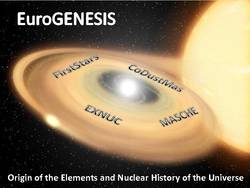The European project EuroGENESIS ends successfully and opens the way to new researches in nuclear astrophysics [NOT TRANSLATED]

EuroGENENSIS has been determined as a very successful project by its evaluators, due to the high number of scientific publications and the relevant advances generated. Because of this, as Dr. Jordi José says, ‘Now it is necessary to develop a structure that allows to consolidate the boost obtained in this field thanks to the program, through new projects that will consolidate the established collaborators network. Only like this it will be possible to maintain the interdisciplinary character of nuclear astrophysics, to make use of the existing infrastructures and synergies and give continuity to the project EuroGENESIS in the future. One of the objectives that is pretended to assume is to position nuclear astrophysics at the level that it deserves in European institutions and authorities with the aim of fomenting interest between young researchers to create a generational replacement that will continue deciphering the enigmas of the origin of the elements.
The project has permitted, between others, to simulate for the first time in three dimensions the physical processes that govern nova explosions or to go in depth in predictions of the high energy emission during supernova explosions. It has been accomplished, as well, a better characterization of the meteoritical presolar grains with high resolution equipments and have been measured, for the first time in the laboratory, nuclear reactions in temperature and density conditions similar to those that operate in the inside of the stars, eliminating common risks associated to the data extrapolation at low temperatures.
Fundings in nuclear astrophysics through future projects like EuroGENESIS are essential for the use of a lot of leading facilities, equipments and knowledges in the study of this field. The study of the origin of the chemical elements of the Universe can also give answers to transversal questions like the origin of the Earth, evolution of life, stars, galaxies and the Universe, as well as the fundamental rules of Nature. Not forgetting, also, that the technology developed for the research in nuclear astrophysics helps, in turn, to find solutions in other fields of science, like medicine, environmental science or telecommunications. We humans are, in essence, the result of nuclear processes that have produced the necessary chemical elements for life. We are made of stardust. [NOT TRANSLATED]
